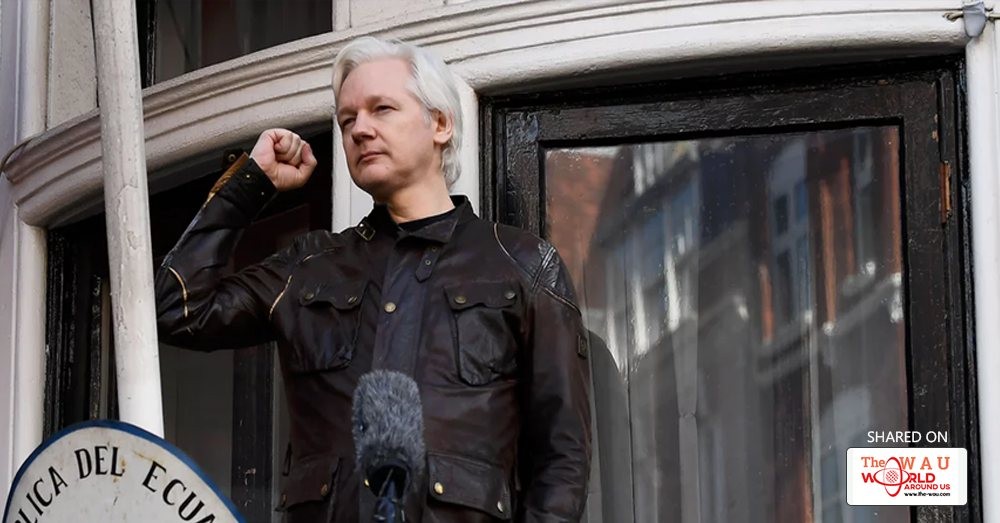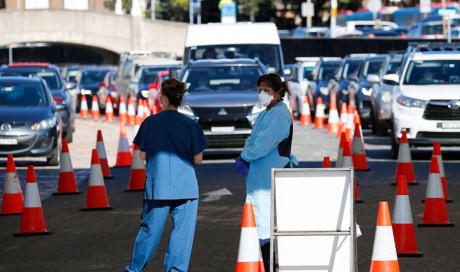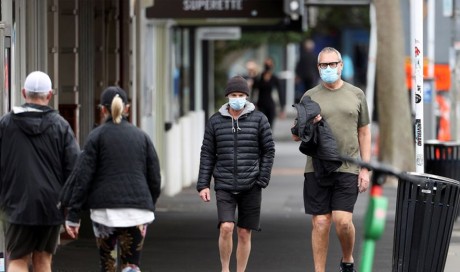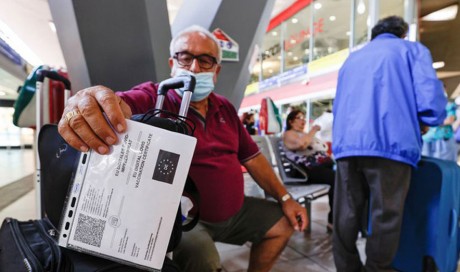Julian Assange has declared that “the proper war is just commencing” after Swedish prosecutors unexpectedly dropped their investigation into an allegation of rape against him, ending a torturous seven-year extradition battle that nevertheless leaves significant question marks over his future.
The 45-year-old WikiLeaks founder appeared on the balcony of the Ecuadorian embassy in London where he had sought asylum in 2012 to avoid extradition to Sweden, and said Friday’s decision was “an important victory”.
After raising a clenched fist in salute, however, he vowed that “threats” made by US officials that he could be arrested on espionage charges “will not be tolerated” and said his organisation was escalating its leaks of documents about the CIA.
Assange still faces arrest over breaching his bail conditions if he leaves the embassy, the Metropolitan police confirmed, and he fears the US will seek his extradition over WikiLeaks’ publishing activities.
Sweden’s director of public prosecutions, Marianne Ny, made the surprise announcement on Friday morning that the country’s authorities would no longer pursue the investigation into a rape claim by a woman in Stockholm in 2010.
Ny’s decision had not been taken because of any judgment regarding guilt or innocence, she said, but because prosecutors had concluded that “all prospects of pursuing the investigation under present circumstances are exhausted”.
If Assange were to “make himself available” to the Swedish courts in future, however, “I will be able to decide to resume the investigation immediately,” she added.
In his appearance on Friday afternoon, the Australian described the period since his initial arrest as a “terrible injustice” and said: “Seven years without charge while my children grew up without me: that is not something I can forgive. That is not something I can forget.”
But Elisabeth Massi Fritz, the lawyer representing the woman who accused Assange of rape, said it was “a scandal that a suspected rapist can evade the law and therefore escape trial by court … My client is in shock and the case being dropped won’t change the fact that Assange has exposed her to a rape. I’m very critical of the decision to drop the case after running a preliminary investigation for so many years.”
Assange appealed to Ecuador for asylum in July 2012 after losing successive UK court battles to avoid extradition to Sweden. An investigation into a separate claim of sexual assault, made by a second Swedish woman, was dropped by Swedish authorities in 2015 after the statute of limitations expired. Assange has always denied the allegations.
Standing before a small crowd of supporters and many more reporters and camera crews, Assange said: “While today was an important victory and an important vindication, the road is far from over. The proper war is just commencing.
“The UK has said it will arrest me regardless. Now the US CIA director [Mike] Pompeo and the US attorney general [Jeff Sessions] have said that I and other WikiLeaks staff have no rights and that my arrest and the arrest of other staff is a priority. That is not acceptable … Our publications are proceeding at speed and that speed in relation to [recent high profile leaks about the CIA] is accelerating.”
But he also attempted a more conciliatory tone, saying his legal staff “have contacted the UK authorities and we hope to engage in a dialogue about what is the best way forward”.
He said the UK had been “exploited” to an extent by the EU and obliged to adopt the European arrest warrant system. Similarly, he said, “with the United States, while there have been extremely threatening remarks made, I am always happy to engage in a dialogue with the Department of Justice about what has occurred”.
Sessions said last month that arresting Assange was a priority, adding: “We’ve already begun to step up our efforts and whenever a case can be made, we will seek to put some people in jail.” Separately, Pompeo described WikiLeaks as a “non-state hostile intelligence service”.
No charges or extradition requests against Assange have been made public, but British authorities have said they would not confirm or deny whether they had received such a request before the person in question had been arrested.
Melinda Taylor, a member of Assange’s core legal team, told the Guardian: “The reason why he entered the embassy in the first place was [the risk of] a national security prosecution [in the US], so since that still exists, the reasons for him entering remain in existence.”
Asked if that meant that Assange would not leave the embassy without an assurance from the US that he would not be prosecuted, she said: “I can’t say he will stay in there indefinitely, but I would hope that [events] won’t force him to do so, that things will come to a head now that there’s no longer a Swedish arrest warrant [and] the US will be forced to make its intentions clear.”
Guillaume Long, Ecuador’s foreign minister, welcomed the Swedish decision and said his country would now try to negotiate safe passage for Assange. “Given that the European arrest warrant no longer holds, Ecuador will now be intensifying its diplomatic efforts with the UK so that Julian Assange can gain safe passage, in order to enjoy his asylum in Ecuador.”
He described the conduct of Swedish prosecutors as “wholly unacceptable … which has led to unnecessary delays in progressing this case”.
A Home Office spokesperson said the British government had no involvement in the decision to drop the investigation. The European arrest warrant against Assange was formally withdrawn at a London magistrates court on Friday morning.
Asked about Assange’s situation, the prime minister, Theresa May, said any decision on whether to arrest him if he were to leave the embassy would be a matter for the police.
Sweden and Ecuador have been locked in a lengthy legal stalemate since Assange entered the embassy, with both sides blaming the other for delays. Prosecutors initially insisted that Assange would have to travel to Sweden to be interviewed, which he has consistently refused to do, citing possible onward extradition to the US.
They eventually agreed to question him in London after coming under increasing pressure in Sweden to move the case forward. Assange was interviewed in the embassy in November by Ingrid Isgren, the deputy chief prosecutor.
In his balcony speech, Assange noted that the Swedish decision came in the same week as “another very important victory … even more important and more conclusive than we have had today, and that is the release of Chelsea Manning from prison”.
Manning was convicted in 2013 of passing thousands of classified documents to WikiLeaks three years earlier, leading to the “Cablegate” releases for which Assange was initially sought by the US.
Share This Post















